- Home
- Roddy Doyle
Paula Spencer Page 2
Paula Spencer Read online
Page 2
She copes well. She thinks she does.
—Did you eat? she asks.
—Yeah, he says.
He shrugs.
He probably didn't. She won't press it. He isn't wasting away. Anyway, there's nothing in the house. And he had his lunch. She watched him.
—D'you have your homework done? she asks.
—Yeah.
—All of it?
—Yeah; most of it.
—Ah, Jack.
He smiles.
—I've done everything I need for tomorrow, he says. —Relax.
She smiles. It's a speech, from Jack.
—Bed? she says.
He shrugs.
—Well, I'm going up, she says.
—Okay.
He sits where she was. He picks up the remote.
—Goodnight, love, she says.
—Night.
She goes into the hall. She's tired. She looks at Jack, through the gap between the door and the frame. The couch is up against the wall. She can see a good bit of his face. He's turned on the telly. She hears him bring the sound up, and down. She reaches in, and turns off the light. She sees him look at the door.
—Goodnight, she says, again.
—Night.
He's lit only by the telly now. He's waiting. For her feet on the stairs. He's sitting up.
She goes on up.
She doesn't worry too much about Jack. She doesn't need to, and she doesn't know why not. A dead father, an alcoholic mother – it's not a great start in life. But he's grand. He seems to be.
She's tired.
She's always tired.
Not true. She's tired at night and that's the way it should be. A hard day's work and that. She likes being tired. Tired and sober – it's different. The sleep is different – it's sleep. Although she doesn't always sleep. But it's grand; it's fine. She's not complaining.
Who'd listen?
She brushes her teeth. The important ones are there. The ones at the front. The missing ones aren't seen, unless she smiles too wide. Then the gaps appear. She brushes them well. Brushing will bring the gone ones back. She can believe that sometimes. The new Paula. She can believe nearly anything. She's a bit hysterical. Not now. But sometimes. So happy. Alive. She brushes for lost time. And teeth. Kicked out of her, some of them. Nights and mornings, when brushing wasn't a priority.
She looks in the mirror. There were times when she didn't look. Years.
She knows this mirror. She isn't fooling herself. Yes, she is. And she doesn't care. If she stands here, this way – she looks good.
She looks good.
This distance, this light. She's a good-looking woman.
But she can't stay here, in the bathroom. One part of the bathroom.
She's a good-looking woman. She takes that with her.
She turns on the bedroom light. There's a mirror here too. She stays clear of that one. She takes off her jeans and lets them drop. They fall off her. She doesn't have to pull them off. They fit.
She pulls back the blanket and sheets. She'd like duvets for the beds. They're on the list. She makes the beds these days. Hers and Jack's. She makes them in the morning. Before she goes to work.
She gets into the bed. It's a good bed. A good mattress. She's puked in this bed and she's pissed in this bed. She can think of that; she can remember waking up to it. She can think back now without curling up, or wanting to. She likes this bed. She remembers. Four years after her husband died, five years after she threw him out, she moved over to the middle.
She lies there. She knows. She won't sleep. Not for a while. Jack is down there. Leanne is out.
It's grand. She lies there. She's a mother. It's the job.
She doesn't feel bad. She knows that, suddenly. She's nicely tired. The heaviness is gone. The ache. Or most of it.
That's Jack. She thinks that. And the nap in front of the telly. But mostly Jack. And it would have been the same with Leanne, if she'd come home before him. Just the contact. It's enough. She believes that, most of the time. She believes it.
She's a mother. Still a mother.
She'd still get up. She knows it. If there was anything to drink in the house, she'd get up now and drink it. She'd knock it back and promise herself a fresh start in the morning, as it soaked the back of her mouth. She knows. She can taste it.
She'd do it.
But there's nothing to drink in the house. And that's fine. It doesn't hurt. The pain is safe, behind other things.
She listens.
Her alarm clock. Paula has an alarm clock. She bought it herself and it often wakes her up. She gets woken by classical music. The music itself is shite but it's a nice way to wake up. At half-seven. Five mornings a week. And sometimes too when Leanne works the weekends. She gets up, to be with her before she goes.
Still a mother.
Leanne often went to school with no breakfast or kiss goodbye.
It's in the past.
She knows that's shite. More than anyone, she knows. You can't leave things behind. They come with you.
You can manage. That's the best you can expect.
She manages.
Jack has pushed the sound up. But she can't make it out. She wonders what he's watching. Something he doesn't want to watch with her.
That's fine. It's okay. It's funny.
She knows she's smiling.
It's strange, about the house. About her life. New fridge, old blankets. Does anyone else around here still have blankets?
Plenty. There's plenty like Paula. Although it's changing, the whole place. One of the old shops is a cafe now, opened a few weeks ago. An Italian place, real Italians in it. Not chipper Italians. Selling bread and coffee and oil and other expensive stuff Paula would love to load up on. There's a fella that does the bread and pizzas. She's seen him in the window. A dark guy, not that handsome – something about his hands. She doesn't stop to watch. She can't. She can't be caught. She's a widow. She's a big girl. She can't be gawking in windows at middle-aged young fellas.
Hands.
Black hair on the fingers. The hands are on her neck. She feels the fingers. Rubbing gently. Pressing. Her throat is dry. She can't close her mouth. The fingers press harder. She can't cry out, move her mouth. It's dry. Dust, muck. She tries to shout – anything. Whisper, move. She can't.
She wakes. She's awake.
She bit her tongue. Badly. She tastes no blood. But it's sore. It's very sore.
The door.
She's been asleep.
She's awake.
Leanne's home. The door slammed. She doesn't know that. She bit her tongue. That's what woke her. She's awake now. And she heard the door.
Leanne.
She listens.
How long did she sleep? She looks at the clock. Jesus, does she need glasses now as well? She brings her face closer. An hour. A bit more than an hour.
Glasses.
God.
She listens. Leanne is in the kitchen.
Paula won't get up. Leanne would know. Her mother, the alco, checking up on her. Leave the girl alone. She's grand. She's fine. She's fine.
Paula listens. She hears nothing. No falling over. Nothing stupid. She needn't be worried.
But she is.
She listens.
She crosses the kitchen. She pulls back the curtain. A big blast of sunlight. It would have killed her a few months ago. Guilty! It's grand now, though. She loves a bit of sun.
She fills the kettle. She turns on the radio. The News is on – the European elections. Boring, Jesus. But she leaves it on.
Royston Brady. His posters are all over the place. Energy. Drive. His head is on every pole. She doesn't like that version of handsome. That Daniel O'Donnell look. The mammy's boy. The country's full of men like that. They do nothing for Paula. The Royston fella's in trouble. They're talking about it on the News. Something he said about his da being abducted by loyalist terrorists. She must have missed something – that's her life. It do
esn't make much sense.
She'll be voting for Proinsias De Rossa. She hasn't voted in years. 1977, she thinks. The only time she voted. De Rossa's Labour, and his eyes are gorgeous. And he's nearer Paula's age. He'll be getting her vote, if she gets round to it.
The kettle's going.
She's forty-eight. Today.
She puts two spoons of coffee into the cup. She's thinking of getting a plunger – real coffee. Another thing on her list. Or one of those espresso makers. It would look great, near the window. She's seen them for sale in the new cafe, on her way past. She's not mad about espresso, though. It's too strong, too druggy.
Dangerous stuff.
She wants a drink.
But she's grand. She looks at her hands, the palms down. They don't look too bad. They look fuckin' dreadful but they're not too bad, considering. Her age, her work. Her life. They should be worse. There are badly mended bones in there. There's bad pain on the wet days.
She listens. No one's getting up.
She listens to the radio. They're still on about the elections. Northern accents, talking about Sinn Féin. She doesn't like Sinn Fein. Her husband loved all that hunger strike stuff. The black armbands, the armed struggle. He was going to march, support the hunger strikers. But he never did. How long ago was that? Years – it must be more than twenty. He didn't march. But he stood still for a minute in the kitchen, a minute's silence, after one of the strikers died. They all stood, Paula and the kids. A few hours after Paula had wiped her own blood off the kitchen floor.
She's seen the posters for their Dublin candidate. Mary Lou McDonald. A nice-looking young one. A big smile on her. She wasn't alive, probably, when all that happened.
Paula should have her own posters. Energy. Drive. She sits up straight in the chair. She reminds herself to do it. Straight-backed Paula Spencer.
She hears feet upstairs.
She wonders have they remembered.
It's Jack. She can tell – the time between each step. She imagines him, one foot up, like one of those birds in the water. Calm, waiting.
It's Jack alright, gone into the toilet.
She hears the flush.
She drinks more of the coffee. She can feel it push through her. She can feel it in the hair on her arms.
Jack is coming down.
Leanne is different. Leanne is another bird, one of those little frantic birds. Darting all over the place. Pecking at everything. Her steps are little punches to the floor.
Jack walks in.
—Howyeh, Jack.
—Hi.
—You're up early, she says.
It's June. He's on his holidays. He's usually still in the bed when she goes. She doesn't know when he gets up.
—What has you up?
He looks at the window, at the light.
—Don't know, he says. —Couldn't sleep.
He stands there at the door. His jeans are huge, dragging on the floor. They're down over his arse. She looks at his feet. One of them is off the floor. She smiles.
He moves. It's like he's been kicked, or goosed.
—Oh yeah, he says.
Now he walks in.
—I have a job.
—Ah, great. For the summer, just?
—What? Yeah. Yeah.
—What's the job?
—Lounge-boy.
—Where?
—Finnegan's Wake.
It's the local. Someone bought it a year ago. And the new name went up. Finnegan's Wake. After the famous book.
—What's it like these days? she says.
—Alright; yeah.
—The same crowd?
—Some; yeah. I don't know.
He opens the fridge.
He stood outside that pub when he was a little fella, waiting for her to come out. He stood in the rain. He often did it. She brought crisps out to him, and Coke with a straw. Like it was a treat. There you are, love. More guilt. On her birthday.
Fuck it.
—Would you like a rasher sandwich or something? she says.
—Cool.
She loves that. Coo-il. The way he says it. She looks at the clock. She has loads of time.
She stands up. She gets the pan from the press.
—How did you find out about it?
—What?
—The job, Jack.
—I went in.
—And just asked?
He shrugs.
—Yeah.
—Good man. Will you have a uniform?
—A waistcoat, he says. —Black trousers.
—Nice, she says. —With the name on the waistcoat?
—It's a bit cheesy, he says. —I've to buy the trousers.
—I'll pay for them.
—I'll pay you back.
—Grand.
She puts the heat on under the pan.
—Pass the rashers over to me, love.
He doesn't know it's her birthday. He hasn't a clue. It's fine. It's funny. She throws on the rashers. She steps back. They're spitting. She'll have one herself – it's her birthday.
Finnegan's Wake.
The whole area has changed. She's been here since the beginning. It was a farm a few months before they moved in. It was all young families, kids all over the place. Out in the middle of nowhere. No bus of its own. Near the tracks, but no train station. No proper shops, no pub. No church or schools. Nothing but the houses and the people.
—D'you want toast or ordinary?
—Toast.
—Stick it in the toaster, so.
Another present from Nicola. The toaster.
—And a couple of slices for me.
—Okay.
—Thanks.
It had been great back then. It had been so simple.

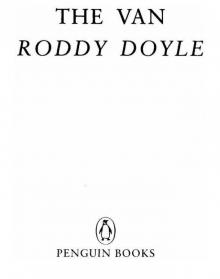 The Van
The Van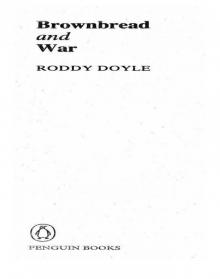 Brownbread & War
Brownbread & War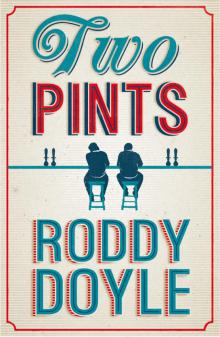 Two Pints: A Collection
Two Pints: A Collection Rover and the Big Fat Baby (Giggler 4)
Rover and the Big Fat Baby (Giggler 4)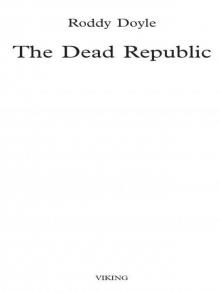 The Dead Republic
The Dead Republic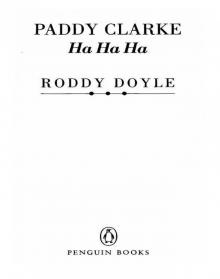 Paddy Clarke Ha Ha Ha
Paddy Clarke Ha Ha Ha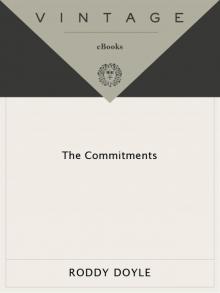 The Commitments
The Commitments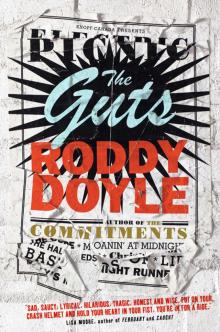 The Guts
The Guts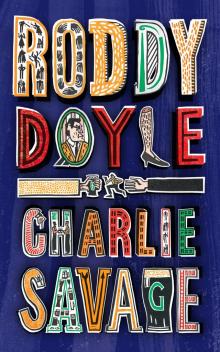 Charlie Savage
Charlie Savage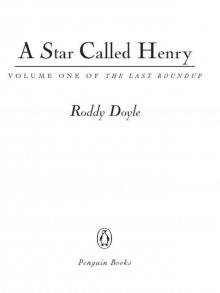 A Star Called Henry
A Star Called Henry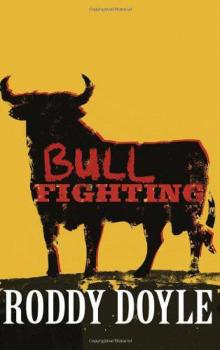 Bullfighting: Stories
Bullfighting: Stories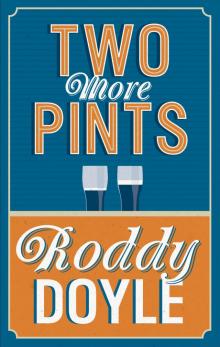 Two More Pints
Two More Pints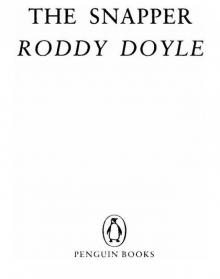 The Snapper
The Snapper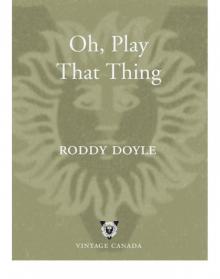 Oh, Play That Thing
Oh, Play That Thing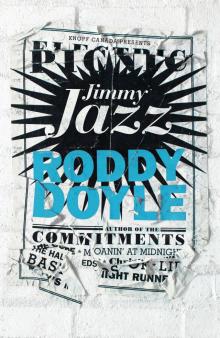 Jimmy Jazz
Jimmy Jazz Paula Spencer
Paula Spencer Wilderness
Wilderness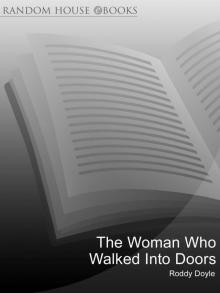 The Woman Who Walked Into Doors
The Woman Who Walked Into Doors The Deportees
The Deportees Rover and the Big Fat Baby
Rover and the Big Fat Baby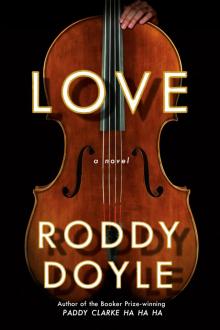 Love
Love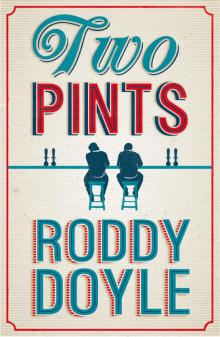 Two Pints
Two Pints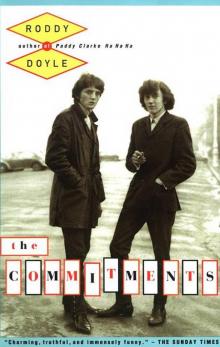 The Commitments b-1
The Commitments b-1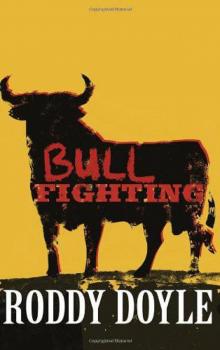 Bullfighting
Bullfighting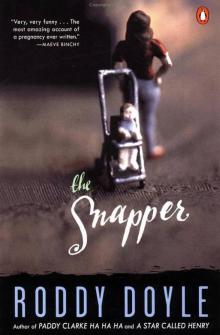 The Snapper b-2
The Snapper b-2